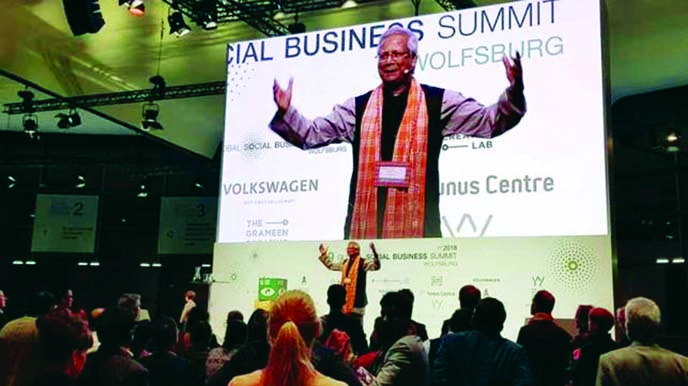
UNB , Wolfsburg, Germany :
Nobel laureate professor Muhammad Yunus has set a 20-year timeline to build a new civilisation alongside replacing the “greed-driven” society which will help remove enormous amount of “frustration and gloom”.
“Twenty years, that’s the timeline. It’s possible,” he said urging all to start the countdown to that end and act on that goal.
While sharing his closing remarks at the 9th Global Social Business Summit at Autostadt on Thursday evening, professor Yunus said any process goes fast when it once starts moving.
Recognising that changes are happening in faster way in the world, he said they will see something is happening around the way a tree grows.
“If we want to build the new civilisation, it will happen. Because we want that. If we want it, no force in the world can stop us,” said professor Yunus who is still young at heart.
The founder of Grameen Bank who is worried about three things-wealth concentration, environmental threats and artificial intelligence-said building a new civilisation is a giant project and a big idea.
“Wonderful things have been done here to see the new civilisation. We’re ready for that. We shouldn’t give up and make it happen in 20 years,” he said.
He said this is a critical moment right now and there is enormous amount of frustration and gloom. “We don’t have to look back. We have already laid the foundation of the new civilisation (through the 9th Summit).”
Yunus said amazing things happened in the Summit-friendship with more people and connectivity with new friends around the world were established.
He hoped more friends will join them to help build new civilisation when the 10th Summit will be held in South Africa next year. “We’ll see the results.”
He said the baby of social business who started journey today with social business will be an adult citizen of the new civilisation.
Yunus said there will be a social stock market in the new civilisation which will not be greed-driven civilisation. “We’ll see the change if we change our mind in the right direction.”
During another session on the closing day, professor Yunus said it will be a circular economy instead of being a wasteful economy as they were discussing building a new civilisation.
Expressing the hope over finding a solution to any crisis, he said, “Every crisis has an opportunity.”
The Grameen Bank founder laid emphasis on taking best advantage of opportunity that every crisis brings.
He advised Volkswagen Group to convert itself into a social business or at least ‘B Corp’ to have better image forgetting the past. “Forget about the past.”
The German car giant came under criticism when it admitted cheating emission tests in the United States three years back.
Certified “B Corporations” are a kind of business balancing purpose and profit. They are legally required to consider the impact of their day-to-day policies and practices on their workers, customers, suppliers, community and the environment.
The European “B Corp” movement, officially launched in 2015 with 60 companies, has now grown to 500+ B Corps and is leading the way in Europe.
Adviser to professor Yunus Nurjahan Begum said women and children are suffering in this world though they do not deserve this miserable life. “To me, a new civilisation means a world where nobody will suffer but will lead a happy life.”
Nurjahan said she wants to see a world which is free from poverty. “And of course, a world without any boundary.”
Yunus also offered his vision of an emerging new economic system in his new book ‘A World of Three Zeros: The New Economics of Zero Poverty, Zero Unemployment, and Zero Net Carbon Emissions.
In Germany until 12 November, he himself will give an insight into the concept of social business in his talk about his new book.
In Berlin, Hamburg, Frankfurt and Wiesbaden, he will take the time to answer questions about social business and how he imagines this new economic system.
These events will end with a book signing session.
Meanwhile, the 9th Global Social Business Summit (GSBS) ended seeking genuine efforts to address key global challenges and build a future that will spread happiness around the world through desired transformation.
Experts from the private sector, civil society, governments and academia-around 800 participants from 55 countries-shared their ideas on how together a new civilisation can be built giving everybody a better life and better future.
They focused on plastic and circular economy, mobility, solidarity, sports and social business and food and its value during the two-day Summit with a hope to see big smiles around.
The prominent speakers explored ideas of how mobility and social business can create a better future for disadvantaged groups and improve people’s life in a sustainable way of transportation.
The circular economy got the special focus at the Summit as the concept recognises the importance of the economy needing to work effectively at all scales-for large and small businesses, for organisations and individuals, globally and locally.
The speakers stressed that transitioning to a circular economy represents a systemic shift that builds long-term resilience, generates business and economic opportunities, and provides environmental and societal benefits.

